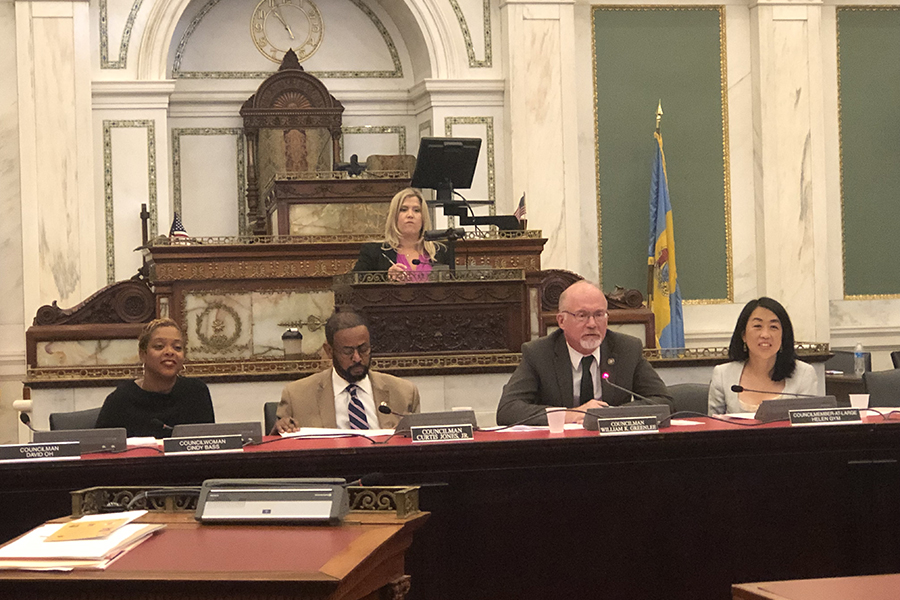Philadelphia City Council’s Law and Government Committee held a public hearing Wednesday morning about “an inclusivity package” of three proposed bills that would expand protections for trans and gender-nonconforming Philadelphians.
Councilmembers William Greenlee, Curtis Jones, Cindy Bass and Helen Gym heard testimony at the City Hall meeting from LGBTQ community leaders, organizations and activists in support of the legislation. A fourth bill discussed would require City officials to routinely disclose legal settlements.
Gym, who introduced the four bills, said the policies come on the heels of the murders of 18 trans women across the country this year. These include Tameka Washington, a 40-year-old trans woman killed in North Philadelphia in May.
“We’ve watched in horror as members of our LGBTQ community have been attacked, silenced and robbed of dignity that so often many of us take for granted. … Today’s inclusivity package of three bills that expand the recognition of responsibility toward our trans community are about honoring Tameka Washington’s life, her right to exist, her legacy, because trans rights are human rights,” Gym added.
Two of Gym’s bills, Nos. 190558 and 190651, call for amending the city’s Fair Practice Ordinance to require youth organizations to adopt guidelines ensuring nondiscriminatory treatment of trans and gender-nonconforming youth and expanding the definitions of gender identity and sexual orientation in The Philadelphia Code, respectively.
The third LGBTQ-related bill, No. 190559, would require City Hall to have at least one gender-inclusive bathroom on each of its floors and require the Department of Public Property to annually file a report of new construction and renovations projects indicating the number and location of gender-inclusive bathrooms that are installed. It would build on Philadelphia’s existing requirement that calls for any new City building to include such facilities.
The final bill discussed Wednesday, No. 190608, calls for the City to disclose discrimination, harassment and employee misconduct settlements and judgments on a quarterly basis in efforts to increase transparency.
Co-sponsored by Jones and Councilmember Kenyatta Johnson, the policy would apply to cases resulting in city payments of at least $20,000, though Gym said the committee is re-thinking the monetary threshold. She added, “We should not be looking at the problematic behaviors in terms of the amount of what we payout because we cannot allow our society to only be shocked by the most outrageous, most extreme ‘can you believe it.’ … That’s not our standard here.”
Rue Landau, executive director of the Philadelphia Commission on Human Relations, endorsed the inclusivity bills. It’s important for the city to take the lead in protecting its queer citizens by strengthening local laws “at a time when the federal government is rolling back civil rights protections for the LGBTQ community, especially for the almost 1.4 million Americans who identify as transgender or gender nonconforming,” she testified, adding Philadelphia is no stranger to paving the way for LGBTQ inclusivity.
In 1982, Philadelphia amended its Fair Practices Ordinance to provide nondiscrimination protections to gay and lesbian people in employment, housing and public accommodation. The policy expanded in 2002 with safeguards for gender identity and expression.
LGBT Office of Affairs policy fellow Sayeeda Rashid read testimony at the hearing in support of the “inclusivity package” bills on behalf of the unit’s deputy director Evan Thornburg.
“The Mayor’s office is proud of City Council’s unwavering commitment to the rights and safety of transgender and nonbinary individuals in public spaces, and believes it is important to update the City’s progressive policies supporting this population,” Rashid said.
Referencing the death by suicide of North Philadelphia man Maurice Willoughby — which was partially attributed to bullying stemming from him dating a trans woman — as something that “we just should not have happen anywhere,” Bass said that Philadelphia is “a very progressive city” but there is “still a lot of work that needs to be done.”
Chris Bartlett, executive director of William Way LGBT Community Center, echoed statements that the legislation is especially important in today’s national political climate.
“As a new and growing generation of trans and gender-nonconforming young people enter the organizations that serve Philadelphia, the need for sensitive anti-discriminatory policies becomes even more urgent,” Bartlett said. “At a time when the president of the United States has consistently targeted our trans and gender-nonconforming citizens, it’s more important now than ever that Philadelphia stand in solidarity with them to say that our city’s a place of sanctuary for trans and gender-nonconforming citizens,” he added.
Itzela, a 10-year-old nonbinary youth advocate with Philly Family Pride, testified in support of Bill 190558. They said their family and school support their identity, but “it can still be hard” because some educators “do not understand the children they are working with.”
“While sometimes people can be mean, other people can be hurtful without meaning to be,” Itzela said. “When people misgender me, it can be painful. Sometimes people tell me how hard it is for them to use they/them pronouns. I don’t need to hear it’s hard; I don’t expect people to be perfect. I only ask that people try and respect me for who I am.”
The committee unanimously advanced the four bills, which will move to final passage in a City Council meeting where all 17 councilmembers will vote.

